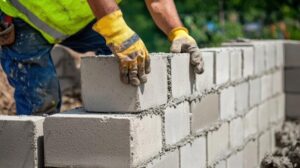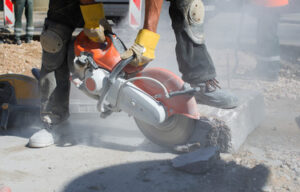Concrete Greensboro NC is everywhere – in roads, buildings, and even our homes. It’s incredibly strong, and it continues to get stronger after it sets. What makes it so popular?

Concrete is a mixture of aggregates (natural sand, gravel or crushed stone), a water-based binder called Portland cement and other additives. Different mixes are made for specific applications.
Concrete is an incredibly strong and versatile building material that’s used to create structures like bridges, dams, and roads. It’s also a popular choice for building homes and commercial structures because it’s less expensive than other materials and can hold heavy loads. However, concrete can also be damaged by fire or earthquakes. This is why it’s important to use it with the right tools and knowledge to ensure its quality.
The strength of concrete is determined by its compressive and tensile strengths. The tensile strength is the capacity of the concrete to resist stretching or pulling forces. It’s typically tested after 28 days of curing. Compressive strength is the concrete’s ability to withstand a large amount of pressure or stress. It’s usually measured by crushing a cylindrical sample of the concrete.
While concrete is a relatively inexpensive material, it requires professional mixing, pouring and curing to achieve the desired results. This process can be complex and time-consuming, especially on larger projects. It’s also important to choose the correct mix design to get the best results. For example, a low water-cement ratio can increase permeability, which can lead to cracking.
A high water-cement ratio can result in low permeability, but it can also reduce the strength of the concrete. This is why it’s important to test your concrete for permeability.
The main component of concrete is aggregates, which are granular materials that make up 60 to 75% of the mixture. Aggregates can be coarse, like gravel or crushed stone, or fine, such as sand. The type of aggregate used depends on the intended purpose of the concrete. It should be chosen for its durability, size and shape, surface texture, abrasion resistance, skid resistance, and other factors.
In addition to its strength, concrete is durable and resists environmental wear. It can withstand freeze-thaw cycles, deicing chemicals, and heavy traffic. Its watertight nature means it is also an excellent choice for areas prone to frequent rain and severe weather. It can also be molded into various shapes and colored with pigments to match different styles and needs.
Durability
Concrete is a durable construction material, capable of withstanding heavy loads and environmental wear and tear. It can also be molded into various shapes and aesthetic finishes to suit different design needs. This durability makes it an excellent choice for roads, sidewalks, and airport runways, as well as other transportation infrastructure. It is also a sustainable building material, with fewer maintenance requirements than other materials such as steel and wood.
Durability is a key attribute for concrete structures, as it ensures that the structure will remain sound and functional throughout its service life. It is determined by tests that measure the permeability and strength of the concrete. Durability is also influenced by factors such as mixing, construction practices, and curing. Inappropriate use of these factors can lead to premature deterioration, which costs billions annually worldwide. The good news is that concrete can last up to 200 years with proper conditions and protection.
During construction, it is important to make sure the concrete mix is properly mixed and consolidated. This can help to reduce the permeability of the concrete and prevent segregation. It is also important to keep the concrete moist and hydrated during placing and finishing, to avoid surface scaling and blistering. The use of an admixture such as air-entrainment admixture can also improve the durability of concrete. It reduces permeability and protects against chloride ingress and expansions in mortar bars due to alkali-silica reactions and sulfate attacks.
The durability of concrete is determined by testing its ability to resist tensile stress and compressive stresses. It is also tested for its resistance to lateral forces, which are important in beams and slabs. It is a key factor in the design of bridges and dams, as it must be able to withstand high levels of stress.
Aside from its strength, concrete is highly durable, and can withstand a wide variety of weather conditions, including freezing temperatures and deicing chemicals. It is also a greener building material, as it uses locally available and renewable raw materials and requires low energy to produce. Moreover, it has an excellent thermal mass, which means that it can absorb and retain heat, saving on heating and cooling costs.
Flexibility
Concrete is a versatile construction material that is used to build a variety of structures, including bridges, sidewalks, and runways. It has many advantages over other materials, including its durability and strength. It also has a high thermal mass and can reduce energy costs by retaining heat. Its low maintenance requirements make it an excellent choice for outdoor spaces, and it resists stains and other contaminants. However, concrete can be dangerous if it isn’t mixed and installed properly. For this reason, it’s important to use a professional contractor when building with concrete.
While concrete is a strong material in compression, it has very little strength when it is pulled, bent, or stretched. This is because it is a brittle material. Consequently, it is often combined with another material that can withstand tensile forces. Steel reinforcing bars, mesh, or cables are typically used to improve the tensile strength of concrete. In addition, concrete is often reinforced with glass fibers to add flexibility.
A team of researchers at the University of New Mexico has developed a new type of concrete that is both strong and flexible. Their material blend uses a high concentration of short, polymeric fibers to add both tensile strength and flexibility. The material is also made of recycled aggregates and Portland cement. It is a combination that could revolutionize the way concrete is built.
This innovative concrete is called ConFlexPave, and it’s able to bend without cracking or breaking. The concrete’s flexural modulus is three hundred times higher than traditional concrete, and it can take up to six times more strain before it fails. It’s also more resilient than other concretes and can withstand earthquakes.
While this may seem like a minor technological advancement, it has the potential to save billions of dollars in global infrastructure maintenance. If it is poured widely, less concrete will need to be replaced, which will save money, resources, and energy. It will also increase the lifespan of roads and bridges, which is an important factor in reducing greenhouse gas emissions.
Cost
Concrete is a mixture of aggregates (like sand or crushed rock) bound together by water and a hydraulic binder (like Portland cement). The proportions of these ingredients are adjusted to match the specific purpose. In addition, additives like plasticisers and air entrainers can enhance the concrete’s characteristics. For instance, they can help the mix set faster or improve its workability. This customization allows contractors to use concrete for a variety of construction projects, from domestic foundations to large infrastructure developments.
The cost of a concrete project depends on the size, location and complexity. For example, a residential patio requires fewer square feet than a garage floor or commercial slab, so the price per sq. ft. will be lower. In addition, larger projects usually benefit from bulk ordering, which lowers the per-unit cost. The amount of reinforcement used also affects the final cost. Concrete slabs with heavy load-bearing requirements typically require high-strength concrete and extra reinforcement, which increases the overall cost.
Labor is a significant expense for any concrete project. It includes site preparation, formwork setup and removal, as well as cleanup time. In addition, workers must wear appropriate safety gear, including hard hats and protective gloves. Some projects require specialized skills, such as complex design or decorative concrete, which increases the labor costs.
Another factor that can influence the cost of a concrete project is the location and accessibility of the job site. The distance from a concrete plant to the project site can result in higher delivery fees. Concrete prices can also vary based on the season. Contractors are busiest during the spring and summer, which can lead to higher prices.
Despite its relatively high price tag, concrete is a sustainable building material. Its durability and longevity reduce the need for frequent replacements, which cuts down on waste. Additionally, concrete’s thermal mass properties can help regulate temperatures, lowering energy costs for homeowners and businesses. In addition, concrete is a completely inert material when it’s cured, so it doesn’t produce any harmful gases or volatile organic compounds. Lastly, concrete is recyclable, so it can be broken down and turned into new aggregates or used in other applications.
